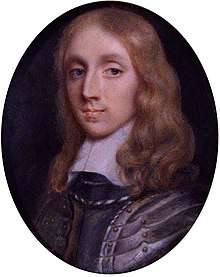Lord Protector
Lord Protector (plural: Lords Protectors) is a title that has been used in British constitutional law for the head of state. It is also a particular title for the British heads of state in respect to the established church. It is sometimes used to refer to holders of other temporary posts, for example, a regent acting for the absent monarch.
Feudal Royal Regent
The title of "The Lord Protector" was originally used by royal princes or other nobles exercising an individual regency (i.e., not merely as a member of a collegial regency council) while the English monarch was still a minor or otherwise unable to rule.
Notable cases in England:
- John, Duke of Bedford, and Humphrey, Duke of Gloucester, were (5 December 1422 – 6 November 1429) jointly Lords Protector for Henry VI (1421–1471);
- Richard Plantagenet, Duke of York, was thrice (3 April 1454 – February 1455; 19 November 1455 – 25 February 1456; and 31 October – 30 December 1460) Lord Protector for Henry VI;
- Richard, Duke of Gloucester, was "Lord Protector of the Realm" (10 May 1483 – 26 June 1483), during the nominal reign of Edward V (one of the Princes in the Tower) before claiming the throne for himself as Richard III;
- Edward Seymour, Duke of Somerset, was Lord Protector (4 February 1547 – 11 October 1549), during the early years of the reign of the young Edward VI;
and in Scotland:
- John Stewart, Duke of Albany, was "Governor and Protector of the Realm" (12 July 1515 – 16 November 1524) for James V of Scotland (1512–1542);
- James Hamilton, Duke of Châtellerault, was "Governor and Protector of the Kingdom" (3 January 1543 – 12 April 1554) for Mary, Queen of Scots.
Cromwellian Commonwealth
| Lord Protector of England, Scotland and Ireland | |
|---|---|
.svg.png) Coat of arms | |
 | |
| Style | His Highness |
| Residence | Palace of Whitehall |
| Appointer | Hereditary |
| Formation | 16 December 1653 |
| First holder | Oliver Cromwell |
| Final holder | Richard Cromwell |
| Abolished | 25 May 1659 |
.svg.png)
The Lord Protector of the Commonwealth of England, Scotland and Ireland was the title of the head of state during the Commonwealth[1] (often called the Interregnum), following the first period when a Council of State held executive power. The title was held by Oliver Cromwell[1] (December 1653 – September 1658) and subsequently his son and designated successor Richard Cromwell (September 1658 – May 1659) during what is now known as The Protectorate.
The 1653 Instrument of Government (republican constitution) stated that—
Oliver Cromwell, Captain-General of the forces of England, Scotland and Ireland, shall be, and is hereby declared to be, Lord Protector of the Commonwealth of England, Scotland and Ireland, and the dominions thereto belonging, for his life.
The replacement constitution of 1657, the Humble Petition and Advice,[1] gave "His Highness the Lord Protector" the power to nominate his successor. Cromwell chose his eldest surviving son, the politically inexperienced Richard. This was a non-representative and de facto dynastic mode of succession, with royal connotations in both styles awarded, (even a double invocation 16 December 1653 – 3 September 1658 "By the Grace of God and Republic Lord Protector of England, Scotland and Ireland") and many other monarchic prerogatives, such as that of awarding knighthoods.
The younger Cromwell, who succeeded on his father's death in September 1658, held the position for only eight months before resigning in May 1659, being followed by the second period of Commonwealth rule until the Restoration of the exiled heir to the Stuart throne Charles II in May 1660.
Lords Protectors (1653–59)
| Portrait | Name | Lifespan | Term began | Term ended | Political affiliation(s) |
|---|---|---|---|---|---|
 | Oliver Cromwell Old Ironsides | 25 April 1599 – 3 September 1658 (aged 59) | 16 December 1653 | 3 September 1658 | New Model Army |
 | Richard Cromwell Tumbledown Dick | 4 October 1626 – 12 July 1712 (aged 85) | 3 September 1658 | 25 May 1659 (Resigned) | New Model Army |
Post-Cromwell
Since the Restoration the title has not been used in either of the above manners. George, Prince of Wales, appointed to the regency in 1811, was referred to as "His Royal Highness the Prince Regent". George exercised the powers of the monarchy, just as Lords Protector had, but the title's republican associations had rendered it distasteful.
Protector of the church
Lord Protector has also been used as a rendering of the Latin Advocatus in the sense of a temporal Lord (such as a Monarch) who acted as the protector of the mainly secular interests of a part of the church; compare vidame.
Notes
- Holland, Arthur William (1911). . In Chisholm, Hugh (ed.). Encyclopædia Britannica. 14 (11th ed.). Cambridge University Press. pp. 655–656.
Sources and references
| Look up lord protector in Wiktionary, the free dictionary. |
- United Kingdom at WorldStatesmen.org